| Srl | Item |
| 1 |
ID:
111621
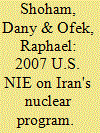

|
|
|
| 2 |
ID:
091449
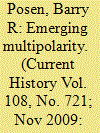

|
|
|
|
|
| Publication |
2009.
|
| Summary/Abstract |
A report titled Global Trends 2025: A Tranformed World, issued last year by the US National Intelligence Council, advises us that a multipolar world-that is, a world characterized by multiple centers of power- is gradually emerging.
|
|
|
|
|
|
|
|
|
|
|
|
|
|
|
|
| 3 |
ID:
127011
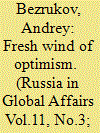

|
|
|
|
|
| Publication |
2013.
|
| Summary/Abstract |
The international system is currently in the midst of a profound crisis. Each cycle of "creative destruction" of the old world order changes "the rules of the game." The new international system will be shaped by new factors of success and new behaviors of its actors. The faster a country adapts to the new rules, the more successful it will be in the coming 10 to 20 years. The speed of the adaptation to the new global environment will greatly depend on the capacity of governments to understand where the world is going and to build a sound competitive strategy.
The Atlantic Council, in its recent report "Envisioning 2030: U.S. Strategy for a Post-Western Word," based on the scenarios published by the National Intelligence Council, believes that the United Stated has a second chance to win the dominant position in the world. Remarkably, Russia gets almost no mention in the report, it is virtually written off as an influential player of the future.
Does Russia have a chance in the new global system? What are its challenges? What should Russia do to succeed? We believe that the success of Russia will depend on its ability to rethink its place in the world and devise a new strategy that would differ from the one it used in era of the Euro-Atlantic great-power rivalry.
|
|
|
|
|
|
|
|
|
|
|
|
|
|
|
|
| 4 |
ID:
128786
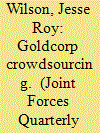

|
|
|
| 5 |
ID:
094080
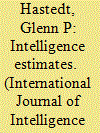

|
|
|
|
|
| Publication |
2010.
|
| Summary/Abstract |
From their earliest days National Intelligence Estimates (NIEs) have had a special, albeit controversial, place in the study of the United States Intelligence Community's analytical products. In its broadest terms, the debate over the significance of NIEs is marked alternately by the Council on Foreign Relations identification of NIEs as the "most authoritative written judgments concerning national security issues,"1 and by the judgment of a panel headed by former Central Intelligence Agency official Richard Kerr-known as the Kerr Group-which concluded in 2004, after looking at intelligence on Iraq, that "historically, with few exceptions, NIEs have not carried great weight in policy deliberations.
|
|
|
|
|
|
|
|
|
|
|
|
|
|
|
|
| 6 |
ID:
058561
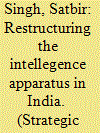

|
|
|
| 7 |
ID:
097837
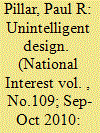

|
|
|
|
|
| Publication |
2010.
|
| Summary/Abstract |
THE POST of director of national intelligence (DNI) has had an unhappy five-year history. Until now it has been easier to blame the successive occupants of the position than to acknowledge the fundamental flaws of the office. Much commentary about the recent ouster of Dennis Blair, for example, has focused on his lack of chemistry with the president, his riling of the Israel lobby by attempting to appoint Chas Freeman to head the National Intelligence Council and a deficiency in political street-fighting skills compared to those of CIA Director Leon Panetta. All those no doubt contributed to Blair's troubles. But one indication that the principal problems are those of the office rather than the occupant is that the job, in such a short time, has now chewed up three able public servants, each of whom excelled in their principal professions (the diplomatic service in the case of the first DNI, John Negroponte, and the military in the cases of Blair and his predecessor, Mike McConnell). More telling still is the difficulty in persuading other able people to take the job. Reportedly, the first to refuse was the future secretary of defense, Robert Gates, one of the most adept officials in Washington at protecting his own reputation; he can certainly recognize a losing hand when he sees one.
|
|
|
|
|
|
|
|
|
|
|
|
|
|
|
|